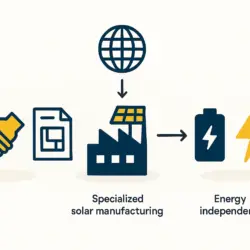Endesa has begun constructing the 69.2 MWp Mudéjar photovoltaic plant in Andorra, backed by a 48.5 million euro investment. The 111.4-hectare site is expected to generate over 128 GWh of electricity annually.
Endesa’s Second Solar Farm in Andorra
Endesa has begun construction on its second solar farm in Andorra, the Mudéjar photovoltaic plant. Developed by its renewable subsidiary, Enel Green Power España (EGPE), the plant will have a capacity of 69.2 MWp and is backed by an investment of 48.5 million euros.

Solar farm construction in Andorra
The Mudéjar photovoltaic plant will be built on the site of a former coal park for the Andorra thermal power plant, utilizing additional land from the closed “Mas de Perlé” landfill.
Spanning 111.4 hectares, the project will feature 126,504 fixed-structure crystalline photovoltaic modules and is projected to generate more than 128 gigawatt-hours (GWh) of electricity annually.
The electricity generated will be enough to power about 32,000 households and prevent the emission of roughly 52,196 tons of CO₂ each year. Endesa reports that the plant is expected to connect to the power grid by the end of 2024.
The Mudéjar project follows Endesa’s first solar initiative in Andorra, the 49.71 MWp Sedéis V solar park, which began operations last December. Both plants are part of Endesa’s strategy to expand its renewable energy footprint in the region, a goal it is pursuing in close collaboration with local associations.
Andorra Expands Solar Energy Footprint with New Projects
Andorra is boosting its renewable energy capacity with several new solar power initiatives. The Andorran government has unveiled plans for three major projects—SolAndorra I, SolAndorra II, and Pyrenees Solar Park—which together will generate approximately 50 megawatts (MW) of clean energy and further strengthen the nation’s renewable infrastructure.
The first and largest of these, SolAndorra I, will have a 25 MW capacity. Located in the La Massana district, the project will cover around 40 hectares and use cutting-edge photovoltaic technology to efficiently convert sunlight into electricity. Once operational, SolAndorra I is expected to significantly reduce Andorra’s dependence on fossil fuels and lower its greenhouse gas emissions.
Contributing an additional 15 MW, SolAndorra II will be located near the town of Escaldes-Engordany. This 20-hectare facility aims to harness the intense, high-altitude sunlight of Andorra’s mountainous terrain and is expected to power local businesses and residential areas, supporting the country’s transition to a greener energy mix.
Finally, the Pyrenees Solar Park will add another 10 MW to Andorra’s renewable energy portfolio. This initiative, located in the eastern part of the country, will be strategically positioned to maximize solar exposure throughout the year. Its design incorporates advanced tracking systems that adjust the solar panels’ angles to follow the sun’s trajectory, boosting overall efficiency.
Impact of the Photovoltaic Plants
These photovoltaic projects mark a major step in Andorra’s energy strategy, aligning with the country’s broader environmental goals. Through this investment in solar power, Andorra aims to reduce its carbon footprint and set a positive example for other small nations facing similar energy challenges.
This push toward solar energy reflects a wider European trend of countries focusing on renewable sources to meet climate targets. For Andorra, these projects promise not only environmental benefits but also economic advantages, as their development and maintenance are expected to create jobs and stimulate the local economy.
The successful implementation of these projects will open a new chapter in Andorra’s energy landscape, demonstrating that even small countries can make substantial contributions to global sustainability. This transition to solar energy will be pivotal in shaping Andorra’s future, paving the way for a cleaner and more sustainable energy system.



